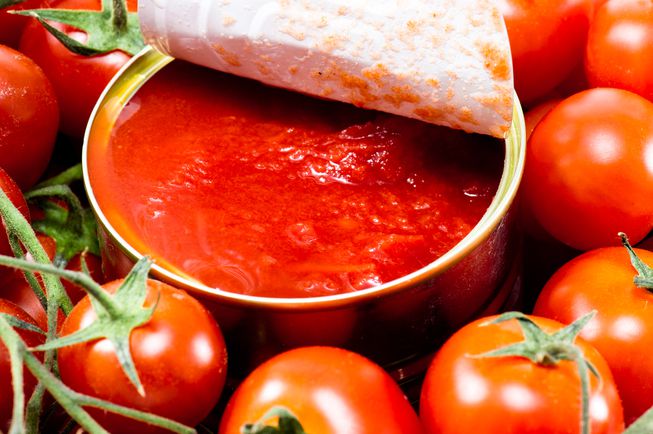
by Tomato Wellness | Mar 19, 2021 | Media Recipe, Recipes
For a delicious and nutritious experience, try out this simple recipe for Pan Seared Pork Chops with Bourbon Peach Compote. We love that this recipe features sweet peaches, tangy tomatoes, and savory pork chops, because they all come together perfectly to create a delectable main dish. Whether you’re looking for a meal to impress a first date or a tasty dinner for your family, this recipe is sure to impress everyone around the table.
When it comes to nutrition, this recipe is teeming with health benefits! Pork is the main protein source here, and this lean meat is a good source of thiamin, selenium, niacin, vitamin B-6, zinc, riboflavin and potassium. Canned Tri-Color Tomatoes take on a starring role in this dish, providing both nutrition and flavor. When it comes to canned tomatoes, lycopene is certainly the star of the show, as it has been shown to help lower the risk of heart disease, prostate cancer and macular degeneration. So, what are you waiting for? Head into the kitchen and try this recipe out for yourself!
Get the full recipe for Pan Seared Pork Chops with Bourbon Peach Compote by visiting our friends at Pacific Coast Producers.
For other delicious recipes, check out some of our favorites:
Chipotle Tomato Rice POWER Bowl
Swiss Chard Pecan Lasagna
Black Bean Corn Chili

by Tomato Wellness | Mar 12, 2021 | Media Recipe, Recipes
Less than 10 ingredients are needed for this flavorful and nutritious Easy Chicken Curry. Thanks to ingredients you probably already have on hand (such as canned tomatoes, frozen chicken, and coconut milk), you can whip up this quick and easy main dish in no time at all! With so many delicious flavors, this is sure to become a family favorite in no time. Be sure to make extras so you can have leftovers throughout the week!
Not only does this recipe taste incredible, but it’s also good for you due to the high protein and lycopene content. Thanks to the chicken, there is plenty of lean protein, which is essential for muscle building and feeling satisfied. And then when you add in the canned tomatoes, you’re provided with a load of vitamins and minerals; including lycopene, which is responsible for that gorgeous bright red hue. The canned tomatoes make up the base for this tangy, spicy dinner, so instead of ordering takeout this weekend, take an hour to prepare this Easy Chicken Curry. We’re sure you are going to love it!
For the full recipe, visit our friends at Pacific Coast Producers.
If you’re looking for other delicious recipes, check out some of our favorites:
Tomato Pesto Hummus
Swiss Chard Pecan Lasagna
Black Bean Corn Chili

by Tomato Wellness | Mar 4, 2021 | Recipes
This tasty main dish for Pizza Stuffed Chicken combines the classic Italian flavors of pizza with protein-packed chicken to make a tender, delicious meal. Canned tomatoes are the star ingredient, making this a convenient and pantry-friendly recipe. Canned tomatoes are also packed with nutrients, including tons of antioxidants, vitamin C, and cancer-fighting lycopene, the compound that gives tomatoes their bright red color. Lycopene has been shown to help prevent cancer, and people who eat more tomato products reduce their risk of developing prostate cancer. This recipe can be customized with your favorite pizza toppings, from pepperoni to black olives. To sneak in some extra veggies, try stuffing with spinach, broccoli, or green peppers.
This dish couldn’t be easier and makes a great weeknight dinner that’s healthier than ordering in delivery pizza. All you have to do is slice the chicken breast to make a pocket and stuff with sausage, diced tomatoes, and mozzarella. Next you’ll bake the chicken and top with more mozzarella, tomatoes, and grated parmesan. You can feel good about feeding this meal to your family, as it’s full of lean protein from chicken breast, as well as fiber, vitamins, and minerals from canned tomatoes. This meal is also budget-friendly, as canned tomatoes are a great affordable alternative to fresh tomatoes that still provide plenty of nutrients and pack in the same flavor punch. We love serving Pizza Stuffed Chicken alongside whole grain spaghetti and a garden salad to create a balanced, filling meal that everyone will enjoy. For the full recipe, visit our friends at Red Gold.
For other delicious recipes, check out some of our favorites:
Chipotle Tomato Rice POWER Bowl
Swiss Chard Pecan Lasagna
Black Bean Corn Chili

by Tomato Wellness | Mar 4, 2021 | Health, News
Did you know that you can seriously reduce your odds of getting cancer by what you put on your plate? You can help fight off this devastating disease by loading your plate with disease-fighting plant foods that are rich in a rainbow of phytochemicals which can provide anti-cancer, antioxidant, and anti-inflammatory activities in every bite. Tomatoes are one food that will help lower cancer risk, as lycopene has been shown to be inversely related to cancer mortality.
In a study written by Cambridge Press University, researchers reviewed the correlation between tomato and lycopene consumption and cancer mortality in a prospective demographic cohort. With the help of the National Health and Nutrition Examination Survey of 1999-2010, the study was able to be conducted successfully and thoroughly. The participants of this study included individuals who consumed tomato and lycopene products in order to determine how the intake of these foods can improve health and reduce cancers risks. With this being said, other factors that may have contributed to decreased longevity of one’s lifespan were taken into consideration so that the data was accurate. The results of the study showed that tomato and lycopene consumption were inversely related to cancer mortality. However, the study suggests that there was no apparent evidence that supported the impact of tomato when comparing older versus younger adults and obese versus non-obese individuals. This enables us to conclude that age and weight were not a contributing factor to the results of this study. Additionally, the results provide sufficient evidence that tomato consumption may have potential benefits in terms of cancer risk reduction.
Other studies have also shown that increased tomato consumption, whether it’s canned or fresh, can reduce prostate cancer in men, decrease cardiovascular diseases, and enhance nutritional value in your daily diet. Thus, canned tomatoes should be a staple in your diet because they are not only nutritious, but they are affordable, easily accessible, delicious, and versatile as well! So the next time you’re at the grocery store, grab yourself some canned tomatoes. They can be incorporated into pastas, pizzas, stews, curries, and more!
For other tomato news, check out:
Top 11 Reasons to Go Red with Tomato Products
Can Tomatoes Help Your Kid Eat More Veggies?
What is Lycopene?

by Tomato Wellness | Mar 3, 2021 | Recipes
Looking for an affordable, no-fuss recipe that your whole family will love? Give this Meatball Parmesan Hot Dish a try. It requires only one dish and makes use of canned veggies and frozen meatballs for an inexpensive, pantry-friendly dinner. Jarred tomato sauce and diced tomatoes add a bright, tangy flavor, and pack in the nutrients. Lycopene, the plant compound that gives tomatoes their signature red color, is a powerful antioxidant shown to help prevent certain cancers, including prostate cancer. Get your daily dose of lycopene, along with vitamin C, potassium, iron, and fiber with this delicious Italian-inspired meal.
Frozen meatballs, jarred tomato sauced, canned carrots, green beans, and tomatoes combine with gooey mozzarella cheese and crispy tater tots to make this simple yet delicious recipe that is sure to become a favorite. It requires just 30 minutes in the oven, and virtually no prep time thanks to the use of frozen and canned foods. Did you know canned tomatoes actually have more lycopene than fresh? The cooking process enhances the compound and makes it more bioavailable, so you can feel good about using canned tomato products for your health. Your wallet and your body will thank you for making this affordable, nutritious meal, and your taste buds are sure to be excited by the classic Italian flavors. Weeknights can be busy, and it may feel impossible to get a healthy meal on the table, but this dish makes it easy. For the full recipe, visit our friends at Del Monte.
If you’re looking for other delicious recipes, check out some of our favorites:
Tomato Pesto Hummus
Swiss Chard Pecan Lasagna
Black Bean Corn Chili





Recent Comments